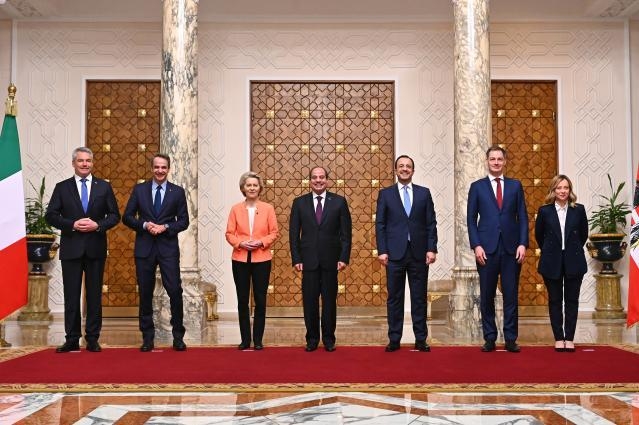A delegation of European leaders met with Egypt’s President Abdel Fattah El-Sisi in Cairo on Sunday to sign a Joint Declaration for a Strategic and Comprehensive Partnership.
The EU delegation, led by European Commission President von der Leyen, consisted of the Cypriot President and the prime ministers of Belgium, Greece, Austria, and Italy. The European leaders’ presence reflected the strength of the bilateral relations between the EU and Egypt, according to the Commission.
As previously reported, the new partnership is supported by a financial and investment package of €7.4 billion for the coming four years (2024 – 2027). Compared to the previous deal with Tunisia last year, this deal is even more controversial due to the authoritarian regime of President El-Sisi, who took power in coup in 2013 after a violent suppression of protestors.
Egypt has been described as a military-dominated dictatorship because of the military’s role in the country’s economy, the imprisonment of political opponents, and the violations of human rights.
While the EU signed a Memorandum of Understanding (MoU) on what it called a strategic partnership with Tunisia, in the case of Egypt it decided to upgrade its existing association agreement from 2004 to a strategic and comprehensive partnership. This is the highest level of an EU partnership with third countries and is normally reserved for major economies and global powers.
The intention to do so was included in a joint press statement at the 20th anniversary of the Association Council in January 2024 but hardly highlighted by the Commission. The impression was that the EU intended to sign a similar MoU as with Tunisia without waiting for the results of the on-going inquiry by the European Ombudsman on how the Commission had addressed human rights concerns.
“We share strategic interests in stability and prosperity,” Commission President von der Leyen said in her press statement in Kairo on Sunday. “Given your political and economic weight, as well as your strategic location in a very troubled neighbourhood, the importance of our relations will only increase over time.”
“Current events confirm once again the vital role that Egypt plays in the stability and security of the region,” she added, referring to the humanitarian crisis in Gaza and the Israel-Hamas war. “And these challenging times have shown the value and strength of our bilateral cooperation and relationship. It is therefore only natural for us to intensify our partnership. We have a mutual interest to do so.”
Common interests or common values
The joint declaration on Sunday mentions that, “Egypt and the EU will continue to work on their commitments to further promote democracy, fundamental freedoms, and human rights, gender equality and equal opportunities, as agreed in the Partnership Priorities”. The EU stands also ready to assist Egypt in the implementation of its National Strategy for Human Rights.
Eric Mamer, chief spokesperson of the Commission, said at a press conference yesterday that a human rights dialogue has been part of the association agreement with Egypt and will continue to be part of the new agreement. According to the spokesperson, the discussion with Egypt on the new agreement was initiated before the outbreak of the Israel-Hamas war.
The declaration states that it is “based on the values of equity and on mutual respect and trust”. What are the reasons for the new partnership with Egypt?
“Egypt is strategic partner in the region,” the spokesperson explained, referring to its geopolitical location. EU sees a potential to strengthen its relations with Egypt in a number of areas, such as energy, trade, investments, water issues, migration and mobility. Egypt has difficulties in managing its borders with its neighbors in civil wars and is close to the Israel-Hamas war in Gaza. There are many issues to be dealt with that requires the EU to work with Egypt.
The partnership will also allow Egypt to negotiate accession to EU programmes such as Creative Europe, Horizon Europe and Digital Europe Programme.
The signature of MoU with Tunisia was reportedly delayed because it lacked approval by the Council but the agreement with Egypt was approved in advance of the EU visit to Cairo, the spokesperson said. However, the loan part of the economic support package requires approval by the co-legislators (the European Parliament and Council), while the grant part is funded by country allocations from existing EU programmes.
To underpin the partnership, the EU has allocated in total €7.4 billion for Egypt for 2024-2027: €5 billion in loans (macro-financial assistance to the Egyptian state budget), €600 million in grants, including €200 million for migration management, for different projects to be developed, and 1.8 billion of additional investments to be mobilized from international financial institutions supported by EU guarantees.
The macro-financial assistance needs to be adopted by the co-legislators and will be followed by agreements (MoUs) on policy reforms agreed with the International Monetary Fund (IMF), according to the Commission.
M. Apelblat
The Brussels Times

